
German postcard (by Photochemie), no. K.158. Photo: Alex Binder, Berlin.
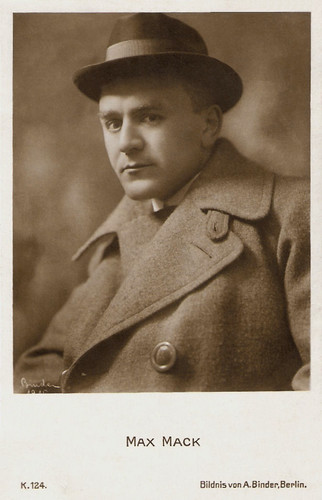
German postcard (by Photochemie), no. K.124. Photo: Alex Binder, Berlin.

German postcard (by Photochemie), no. K.125. Photo: Alex Binder, Berlin.
Leading in German cinema
Max Mack was born Moritz Myrthenzweig or Maimon Myrthenbaum in 1884 in Halberstadt, Germany. He was the son of a Jewish cantor. After graduating from high school, he briefly pursued plans to go into politics, which he discarded, however, in order to join a travelling theatre troupe as an actor. Max worked as a theatre actor at the Stadttheater Eisenach from 1906. From 1907 he was active in Berlin, briefly also in Max Reinhardt's ensemble. The greatest success of his short - but according to Mack quite instructive - time in the theatre came in 1910 when he appeared as a repertory actor in Max Halbe's 'Jugend' (Youth). At the beginning of 1911 he came for the first time in contact with the film business as a writer for Der ehrliche Finder.
Since he had previously attracted attention in a Japanese role at the theatre, he was cast as an Asian character a few times, such as in his screen debut in the Messter production Japanisches Opfer/Japanese victim (Adolf Gärtner, 1910), starring Friedrich Zelnik. After this film, he was brought to Vitascope, where he acted under the direction of Viggo Larsen and Walter Schmidthässler, first in Die Pulvermühle/The powder mill (Viggo Larsen, 1910) with Larsen and his wife Wanda Treumann.
Soon he began to write scripts to increase his salary from 15 to 25 marks - often adding a small part for himself so he could also work as an actor. In keeping with contemporary taste, he wrote mainly scripts with dramatic plots, but also occasional comedies. He made his directorial debut with Ein seltener Fall/A rare case (Max Mack, 1911) for Deutsche Mutoskop und Biograph. He continued working at Vitascope, now also as a director, first in Gehirnreflexe/Brain reflexes (Max Mack, 1911).
He worked for Deutsche Mutoskop und Biograph, Vitascope, Continental-Kunstfilm, e.g. Zweimal gelebt/Lived twice (Max Mack, 1912) with Eva Speyer and Ernst Rückert, and Eiko-Film, such as Der stellungslose Photograph/The positionless photographer (Max Mack, 1912) with Hanni Weisse. Mack paid much attention to modernity. His frontal, symmetric compositions betray his background in theatre. Mack was much beloved and thus an important film pioneer.
Max Mack's film Der Andere/The Other (1913) premiered before Stellan Rye's more famous Der Student von Prag/The Student from Prague (1913). Mack had written the film together with famous stage author Paul Lindau. Der Andere, with renowned stage actor Albert Bassermann in the double lead roles, had the topic of schizophrenia. It is considered the first German 'Autorenfilm' (auteur film), creating recognition for the film medium among the higher classes.
Also in 1913, Mack was leading in German cinema with the public success of the crime comedy Wo ist Coletti?/Where is Coletti? (Max Mack, 1913), starring Hans Junkermann. It is one of the first films to explicitly exploit the urban landscape of Berlin in a fiction film. In Die blaue Maus/The Blue Mouse (Max Mack, 1913), starring Madge Lessing, he showed his predilection for urban nightlife, vaudeville, masked balls and tango. The comedy became the biggest German box office success before WW I, and was also distributed in the United States. Mack's modernity was also expressed in his emancipatory themes such as in the comedy Die Welt ohne Männer/A World Without Men (Max Mack, 1914), with Madge Lessing, and in crossdressing and masquerades.
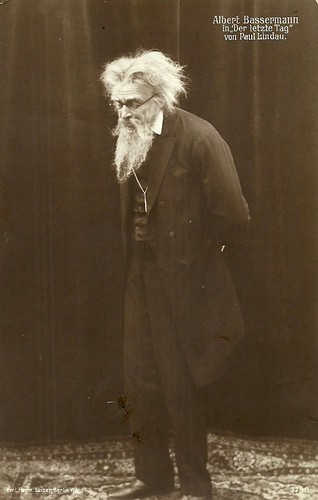
German postcard by Verlag Hermann Leiser, Berlin, no. 7798. Photo: Vitascope. Albert Bassermann in Der letzte Tag/The last day (Max Mack, 1913), scripted by playwright Paul Lindau. Plot: A professor (Bassermann) overthinks his life (in flashback), remembering the decisive day when he killed his longtime cheating and adulterous wife. On his last day, he dies before he can commit suicide.
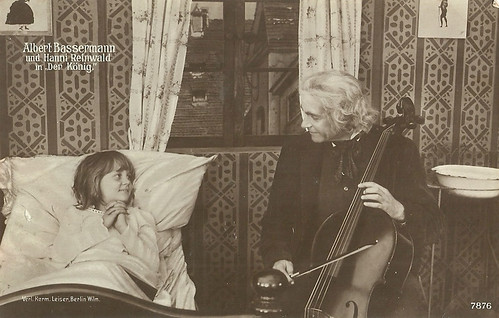
German postcard by Verlag Hermann Leiser, Berlin, no. 7876. Photo: Vitascope. Albert Bassermann and Hanni Reinwald in the film Der König/The King (Max Mack, 1913), based on the novel by Richard Fischer.

German postcard by Verlag Hermann Leiser, Berlin, no. 5571. Photo: PAGU / Union.Ludwig Trautmann as Felix Merkel in Der Katzensteg/The cat footbridge (Max Mack, 1915), based on the famous novel by Hermann Sudermann, and starring George Lengbach.
A Showman Looks Back
From 1912 until the end of the First World War, Max Mack was one of the most productive filmmakers. He directed, and co-starred in Ein Seltsamer Fall/A strange case (Max Mack, 1914) starring Hanni Weisse and Alwin Neuss, an early film adaptation of Dr. Jekyll and Mr. Hyde written by Richard Oswald. The original title of the film was Sein eigner Mörder (His own Murderer) as it is in the only surviving film material. Due to problems with the German censors it was changed for the official release.
As early as 1915, Ernst Lubitsch had small supporting roles in Max Mack's films. In 1916, Mack and Ewald André Dupont published one of the first books on film theory, 'Die zappelnde Leinwand' (The Fidgeting Canvas). In 1917 he founded his own production company, Max Mack-Film GmbH, which merged in 1919 into Solaris Film. With Der Sohn der Magd/The son of the maid (Max Mack, 1919), Mack took part in the then popular genre of the Aufklärungsfilm (enlightenment film), a genre that dealt with taboo subjects such as prostitution and free love.
In 1920 he quit the company and hence worked for a wide range of firms, including Terra-Film, such as Figaros Hochzeit/Figaro's Wedding (Max Mack, 1920) with Alexander Moissi, Esha-Film, International-Film AG, Ufa and Sokal-Film. In the 1920s Mack worked in a wide range of genres: moral dramas, literary adaptations, realist melodramas, comedies, and even tourist films. Mack already took part in sound film experiments with the sketch Ein Tag Film/One Day Film (1928), the first fictional German sound film and with the youth film Der Kampf der Tertia/Fight of the Tertia (Max Mack, 1929) in which he tried a documentary style with amateur actors. This was to be Mack's last respectable success in Germany.
His first full-length sound film Nur am Rhein…/Only on the Rhine (Max Mack, 1930) starring Daisy D'Ora, Igo Sym, and Truus Van Aalten, took up the then-current topic of the occupation of the Rhine, but the plot of a British officer falling in love with a local German mayor's daughter was considered highly controversial. Tausend für eine Nacht/A Thousand for One Night (Max Mack, 1933) and the two-act film Varieté Nr. 7/Varieté Number 7: A Musical Grotesque (Max Mack, 1933) were his last German films before Max Mack emigrated to London via Prague and Paris in 1933 following Hitler's seizure of power.
Max Mack was involved in 138 films during his film career, predominantly before 1920. With the advent of the National Socialists, he was no longer wanted as a Jew. Via Prague and Paris, he emigrated to Great Britain. The plan to build his career in America remained unsuccessful: the only thing he achieved during his brief excursion to Hollywood was a supporting role in the Paramount film You Belong to Me (Alfred L. Werker, 1934). In England, he directed the only moderately successful quota quickie comedy Be Careful, Mr. Smith (Max Mack, 1935). It was followed by two sketch compilations, The Wigan Express (Max Mack, 1935) and Mack's Comedies (Max Mack, 1935). Mack continued to try to get some projects off the ground and founded Ocean Films Ltd in 1936, but he failed first because of a lack of backers and then because of the war.
So with no practical work opportunities, Mack now began to write down his memoirs, under the title 'With a Sigh and a Smile. A Showman Looks Back'. The book was published in London in 1943. He also continued to write articles on film, many of which had been published since 1914. From the 1940s onwards, he kept his head above water with amateur productions, for which he arranged stage plays whose copyright had expired. He married a well-off widow in London, whose mentally disabled daughter he looked after. In 1965, the German ambassador in London presented him with the Filmband in Gold (Golden Ribbon) for many years of outstanding work in German film but he never returned to Germany. In 1973, Max Mack died in London at the age of 88.

German postcard (by Photochemie), no. K.160. Photo: Alex Binder, Berlin.
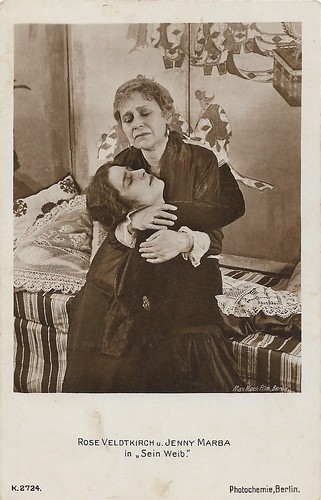
German postcard by Photochemie, no. K.2724. Photo: Max Mack-Film. Rose Veldtkirch and Jenny Marba in Sein Weib/His wife (1918), starring Karl Beckersachs. The film is lost. Plot: A blind man (Beckersachs) has a [his?] child read out compromising letters by his wife (Veldtkirch) and realizes her fidelity.
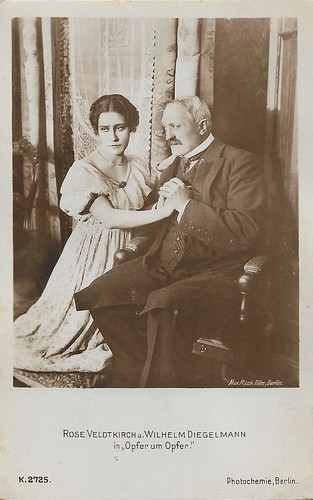
German postcard by Photochemie, no. K.2725. Photo: Max Mack-Film. Rosa Veldtkirch and Wilhelm Diegelmann in Opfer um Opfer/Victim after victim (Max Mack, 1918), starring Karl Beckersachs. The film is lost. The plot deals with a baron (Beckersachs) who ruins the father (Diegelmann) of a girl (Veldtkirch) when the other man doesn't give his consent.
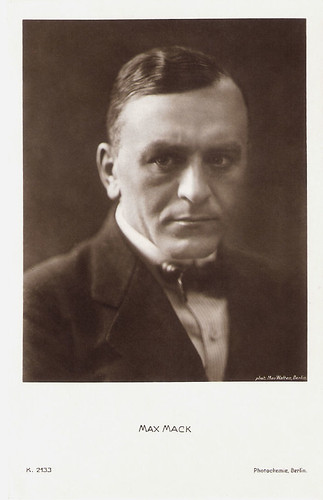
German postcard by Photochemie, no. K.2133. Photo: Mac Walten, Berlin.
Sources: Miranda Reason (Filmportal.de - German), Wikipedia (German and English), and IMDb. In 1996, Michael Wedel published 'Max Mack: Showman im Glashaus'. The Desmet Collection of Eye Filmmuseum (Amsterdam) holds tinted prints of the Mack films Zweimal gelebt/Twice lived (1912), Das Paradies der Damen/The Ladies' Paradise (1914) with Hanni Weisse, and Das Urteil des Arztes/The doctor's verdict (1914) with Albert and Else Bassermann, plus the film Vergebens/In vain (Walter Schmidthässler, 1911) in which Mack acted and for which he wrote the script. The Eye collection also holds beautiful posters for Der letzte Tag/The last day and Die Welt ohne Männer/A World Without Men.
No comments:
Post a Comment